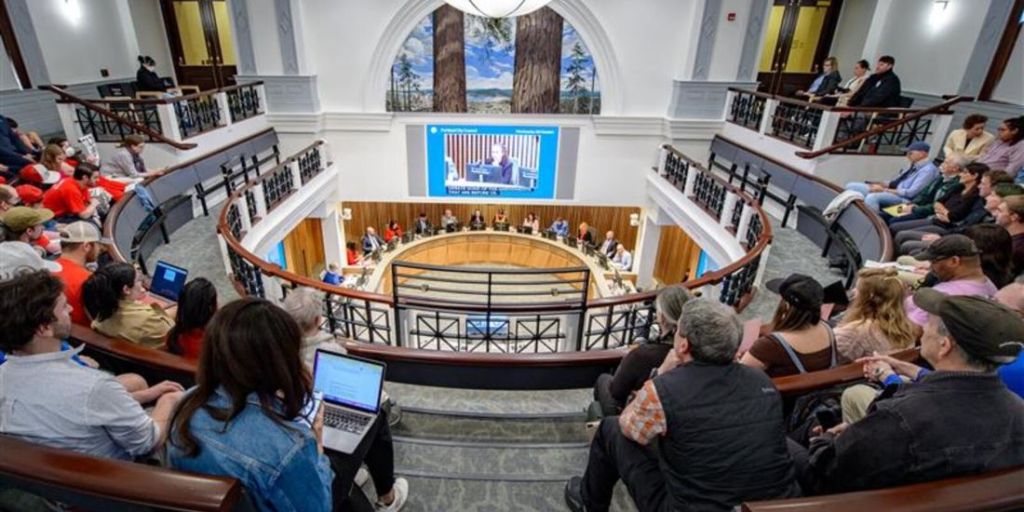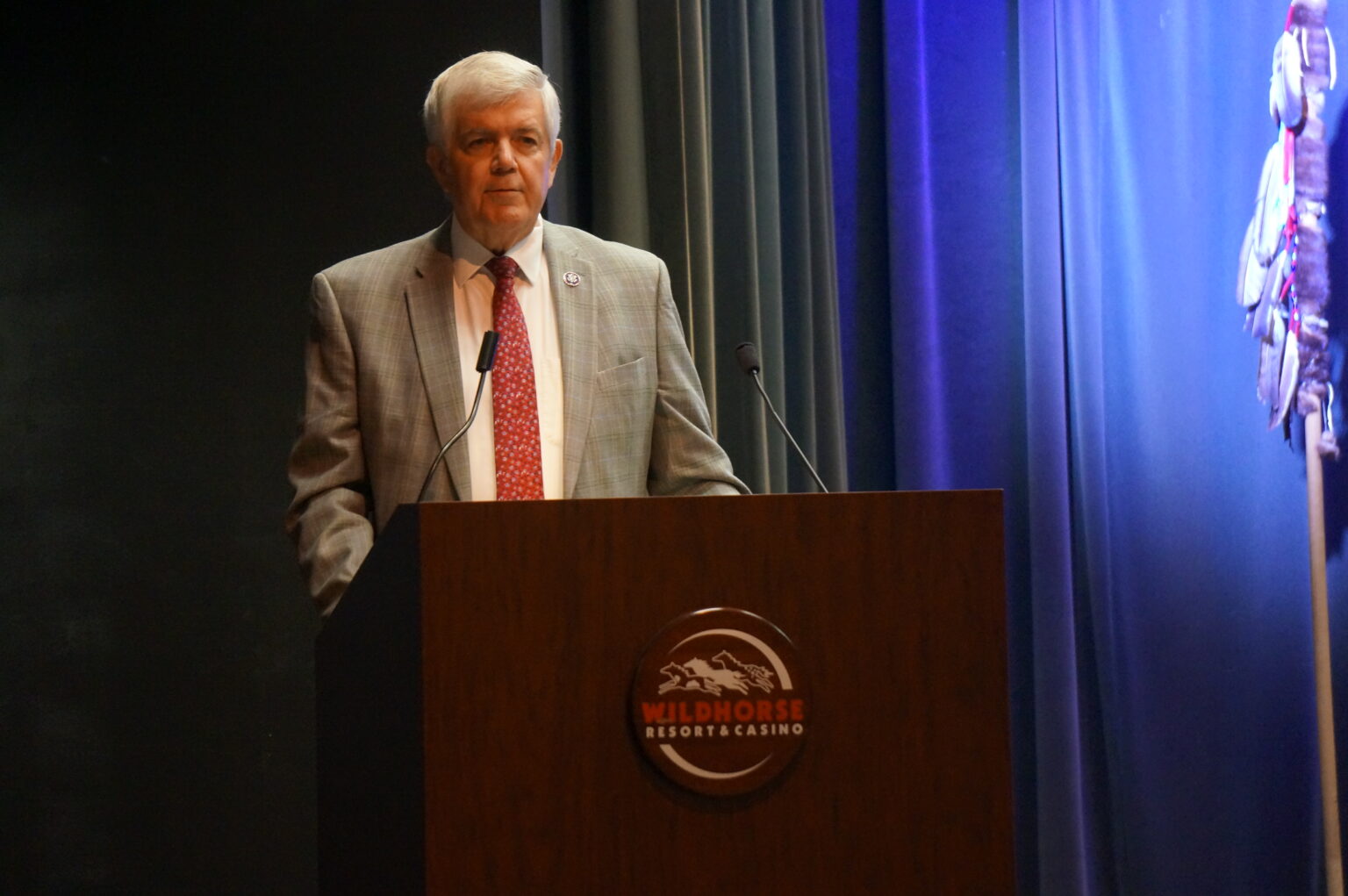UPDATE: Wilson concerned about $1.9 million PPB budget reduction
Published 5:43 am Thursday, May 22, 2025

- The Portland City Council chambers were packed when the council considered the next city budget on Wednesday, May 21. (Courtesy photo submitted by City of Portland)
The Portland City Council approved a preliminary $8.5 billion balanced budget prioritizing parks over police with only minutes to spare on Wednesday, May 21.
During the marathon hearing, the council voted 7 to 5 to transfer $1.9 million requested by Mayor Keith Wilson for the Portland Police Bureau to Portland Parks and Recreation. The vote was a blow to Wilson, who believes public safety must be increased to help the city recover from the economic harm caused by pandemic shutdown.
Trending
The funds would have helped the bureau fill 90 vacant positions. Police Chief Bob Day testified the transfer would decrease public safety.
“The reality is that any reduction in funding to the police bureau will be a reduction in services,” Day said.
District 1 Councilor Councilors Candace Avalos, who co-sponsored the amendment, disagreed.
“This is not about reducing police effectiveness. It is about a balanced approach to public safety that includes well-maintained parks where families feel safe gathering,” Avalos said.
After the vote, Wilson said, “We’re looking at how the decision to remove $1.9 million in proposed PPB funding may impede our efforts to recruit a next generation of law enforcement first responders who will represent and serve our community, as well as the critical missions that get pounds of fentanyl and human trafficking victims off our streets. Any option that repairs, restores, and revitalizes Portland is on the table, including jurisdictional partnerships and collaborations on the crucial public safety issues our community has asked us to solve. We’ve made improvements, but we can’t let our continuing high crime rates, response times, and livability issues go unaddressed.”
The final 12-member council vote was completed just three minutes before midnight, the deadline for balancing the budget for the fiscal year that begins on July 1. Some minor adjustments can still be made by June 11, however. The final vote is scheduled for July 18.
Trending
Councilor’s repeated stressed that the city government is facing a financial crisis requiring tough choices and difficult votes throughout the meeting.
“We’re in a moment of crisis,” Councilor Angelita Morillo said.
Council members proposed 126 amendments to the budget proposed by Wilson and ultimately approved about two dozen of them. Among other things, Wilson’s budget sought to create enough overnight shelters to house all homeless Portlanders by the end of the year, hiring more Portland police officers, and increasing the staff of the non-armed Portland Street Response team.
According to a May 22 city release, major changes will:
- Reduce the mayor’s proposal for the Portland Police Bureau by $2 million to fund parks maintenance. The council hotly debated the impact of this action on the bureau.
- Increase fees on rideshare services like Uber and Lyft from 65 cents to $2 per ride, generating $10 million to support the Portland Bureau of Transportation.
- Increase golf fees to $5, generating $1 million to support parks maintenance.
- Transfer $1 million from the golf fund to support parks maintenance and $1 million to support small-donor elections.
- Reduce the councilors’ individual budgets by $120,000 each for a total of $1.4 million, to support shared council resources.
- Draw down reserve funds to retain 31 positions in Portland Permitting and Development through the end of September.
- Develop a comprehensive plan to manage the city’s infrastructure assets.
- Eliminate the assistant city administrator position and evaluate salaries and classifications for bureau directors and deputy directors.
According to city officials, the budget was especially challenging because Portland faced a historic $93 million general fund shortfall, driven by falling revenues and higher costs.
On the revenue side, many downtown buildings have high vacancy rates, pushing down their value and the tax revenue they generate. Parking revenues are down. Tourism has not yet returned to pre-pandemic levels. And one-time pandemic relief revenues have now dried up.
Meanwhile, inflation has increased prices for the city including the cost of equipment, materials, services, software, insurance, and maintenance. Over the past 10 years, personnel costs have been rising faster than inflation due to salary increases, health care insurance and retirement benefits. Other factors driving up expenses include legal obligations such as building curb ramps and support for fortifying the levees on the Columbia River and high overtime costs due to a shortage of police officers and firefighters.
The May 21 meeting began at 9 a.m. and included more than two hours of public testimony. The council also raised water and sewer rate more than 6%, the largest increase in history, and approved the budget of Prosper Portland, city’s semi-independent economic development agency, without cutting its general fund support, as some councilors had proposed.
City officials transmitted the approved preliminary budget to the Tax Supervising and Conservation Commission for review on May 22, as required by state law. It was required by the Oregon Legislature in 1979 to oversee budgets, taxes, debt and management practices in Multnomah County. The council can still change the budget by June 22, so long as they do not alter the allocation of any of the city’s funds by more than 10%.
A comprehensive list of amendments that were approved will be available soon at Portland.gov/budget.







